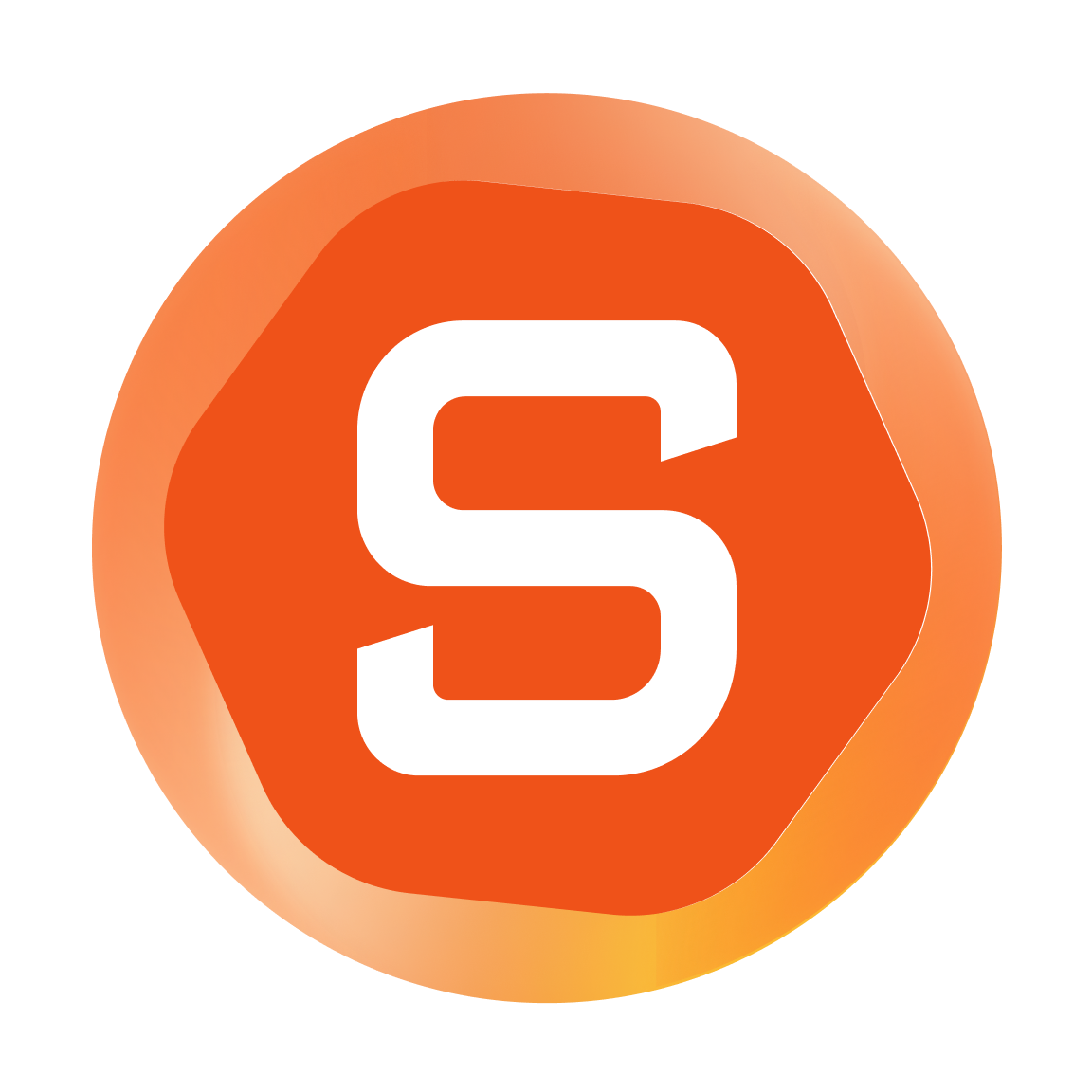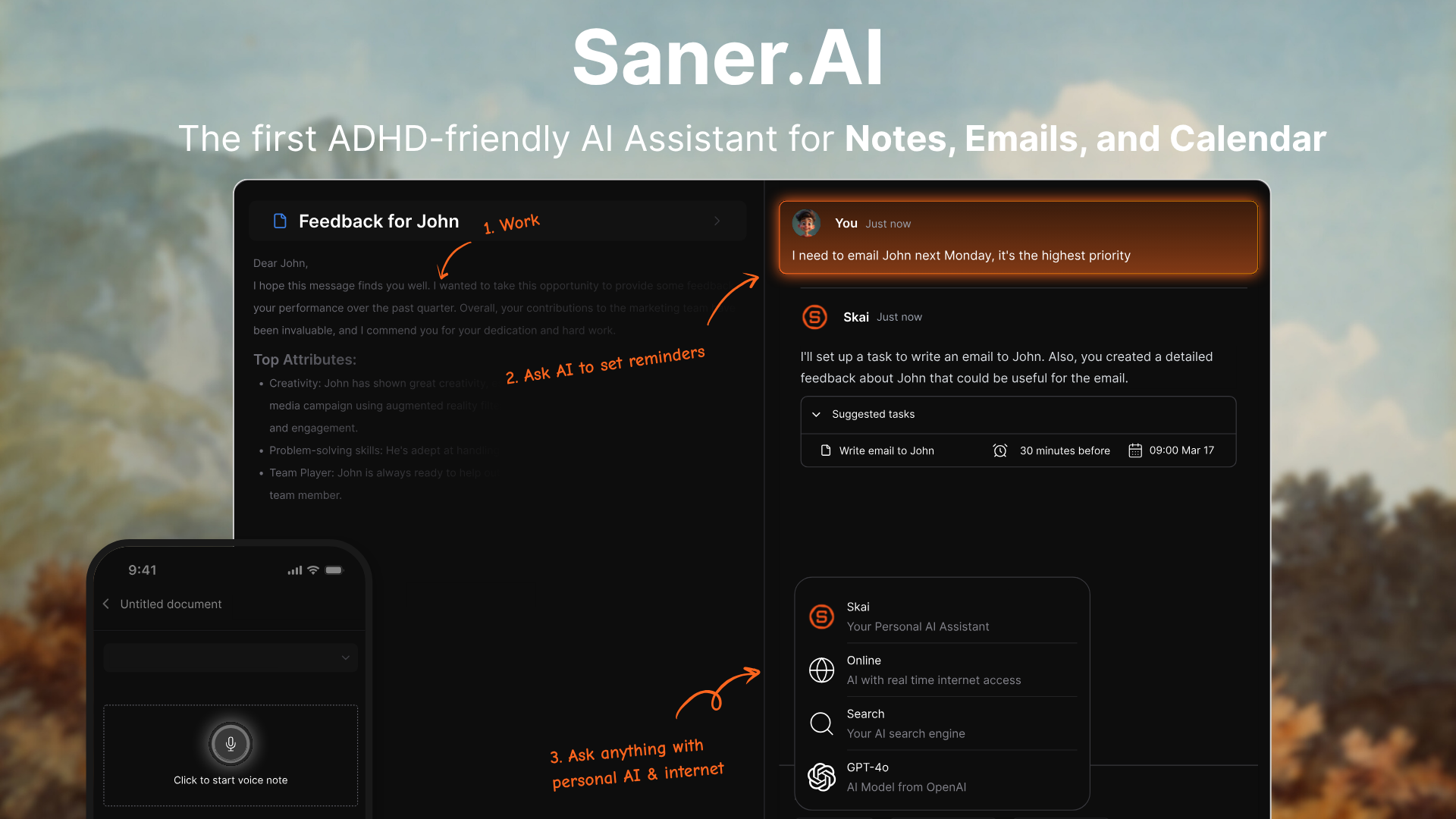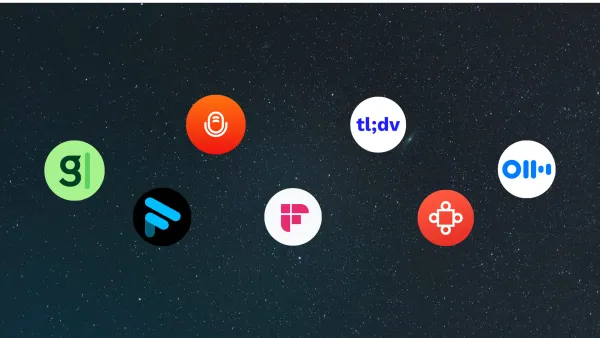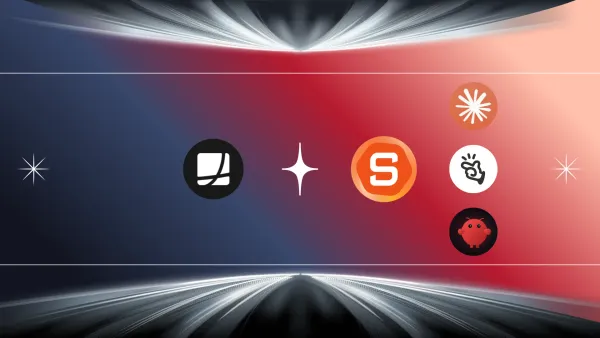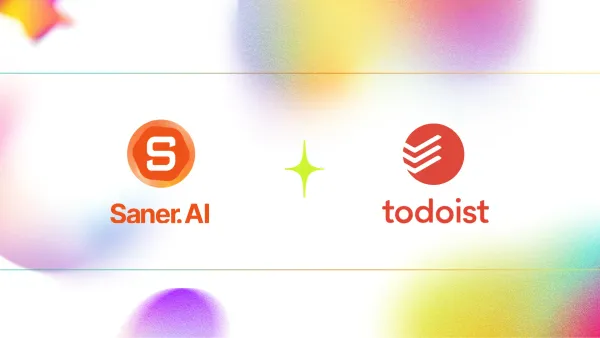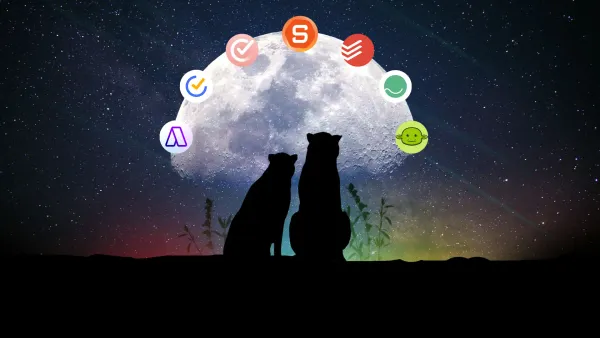Perplexity Alternatives: We Tested The 6 Best Apps (Free & Paid)
The Best Perplexity Alternatives are: Saner.AI, ChatGPT, Claude, Gemini, Grok, and Consensus
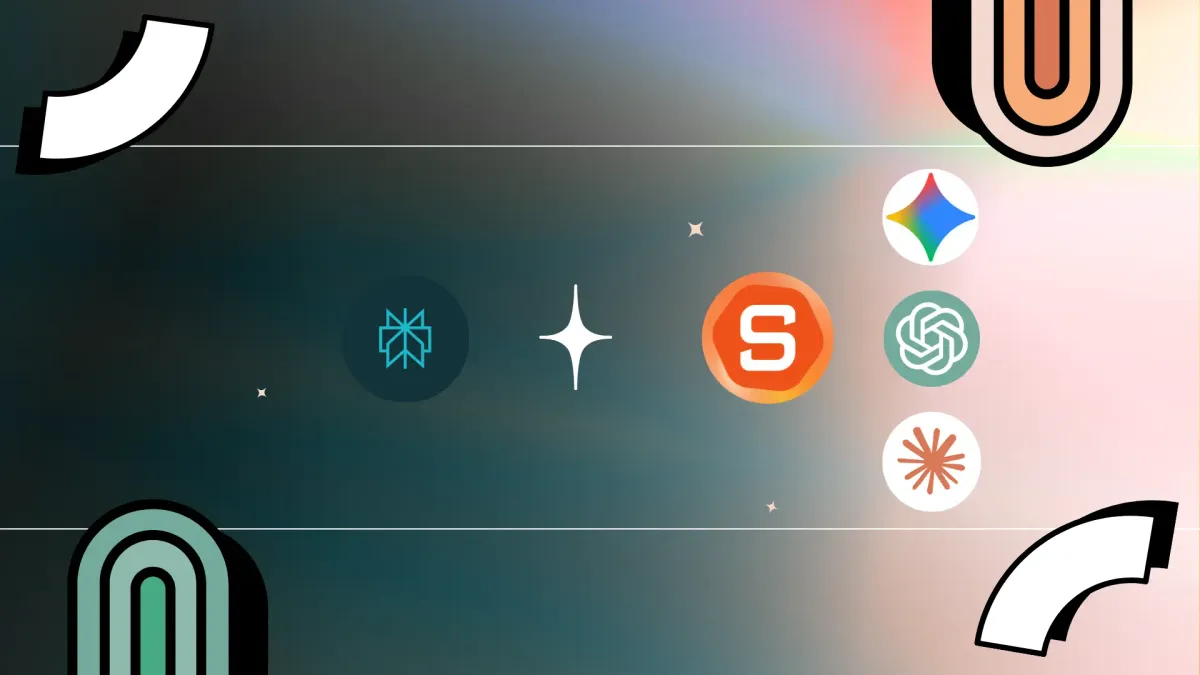
We tested the 6 Best Perplexity Alternatives in 2025
The rise of AI-search tools has been remarkable - and one of the biggest names in that space is Perplexity AI. With its conversational interface, web-sourced citations, and quick answers, Perplexity set a high bar for how we explore and research.
Still, even the best tools have limitations - so many professionals, students, and researchers are asking: what are the best Perplexity alternatives?
In this guide, you’ll discover the best Perplexity alternatives in 2025 - tested, ranked, and explained for real-world use.
Whether you’re doing deep research, creative writing, or productivity workflows, there’s something here for you.
What is Perplexity AI?
Perplexity AI is an AI search assistant that blends traditional web search with conversational Q&A. It pulls in real-time information, often with citations, so users can ask natural language questions and get sourced answers.
Unique strengths include:
- Real-time web access + citations, making answers traceable.
- A conversational UI that feels like chatting rather than digging through search results.
- Quick coverage of broad questions.
That said, some users look for alternatives because of certain limitations: for example, fewer integrations into workflows, limited personalization, usage limits or paywalls, or a need for deeper research or memo-style tools.
Why Look for a Perplexity Alternative?
Here are common reasons users may seek something beyond Perplexity:
- Limited workspace or note integration (you want your research tied to your writing or tasks).
- Lack of customization or memory (the tool doesn’t “remember” your context or preferences).
- Paywalls or usage limits (you may hit monthly caps or need full feature sets).
- Preference for a different tone, depth, speed, or domain-focus (academic research vs. general chat).
- Need for integration into productivity tools (email, docs, calendar, workflows).
Let's dive in!
What Are The Best Perplexity Alternatives in 2025?
The Best Perplexity Alternatives are: Saner.AI, ChatGPT, Claude, Gemini, Grok, Consensus
Comparison Table: Best Perplexity Alternatives
| Tool | Focus | Strengths | Trade-offs |
|---|---|---|---|
| Saner.AI | Productivity / personal | Integrates notes/tasks/search | Less pure web-search depth |
| ChatGPT | Versatile assistant | Broad capability (writing, research, code) | Search citations sometimes less explicit |
| Claude | Research & deep workflows | Strong context handling, tool use | Might feel heavier for quick one-off questions |
| Gemini | AI + search hybrid | Integration with Google ecosystem | Citation style and depth may vary |
| Grok | Real-time search/trends | Up-to-date data, conversational UI | May lack research-citations depth |
| Consensus | Academic research | Rigorous sourcing, peer-reviewed focus | Less playful / general assistant feel |
1. Saner.AI
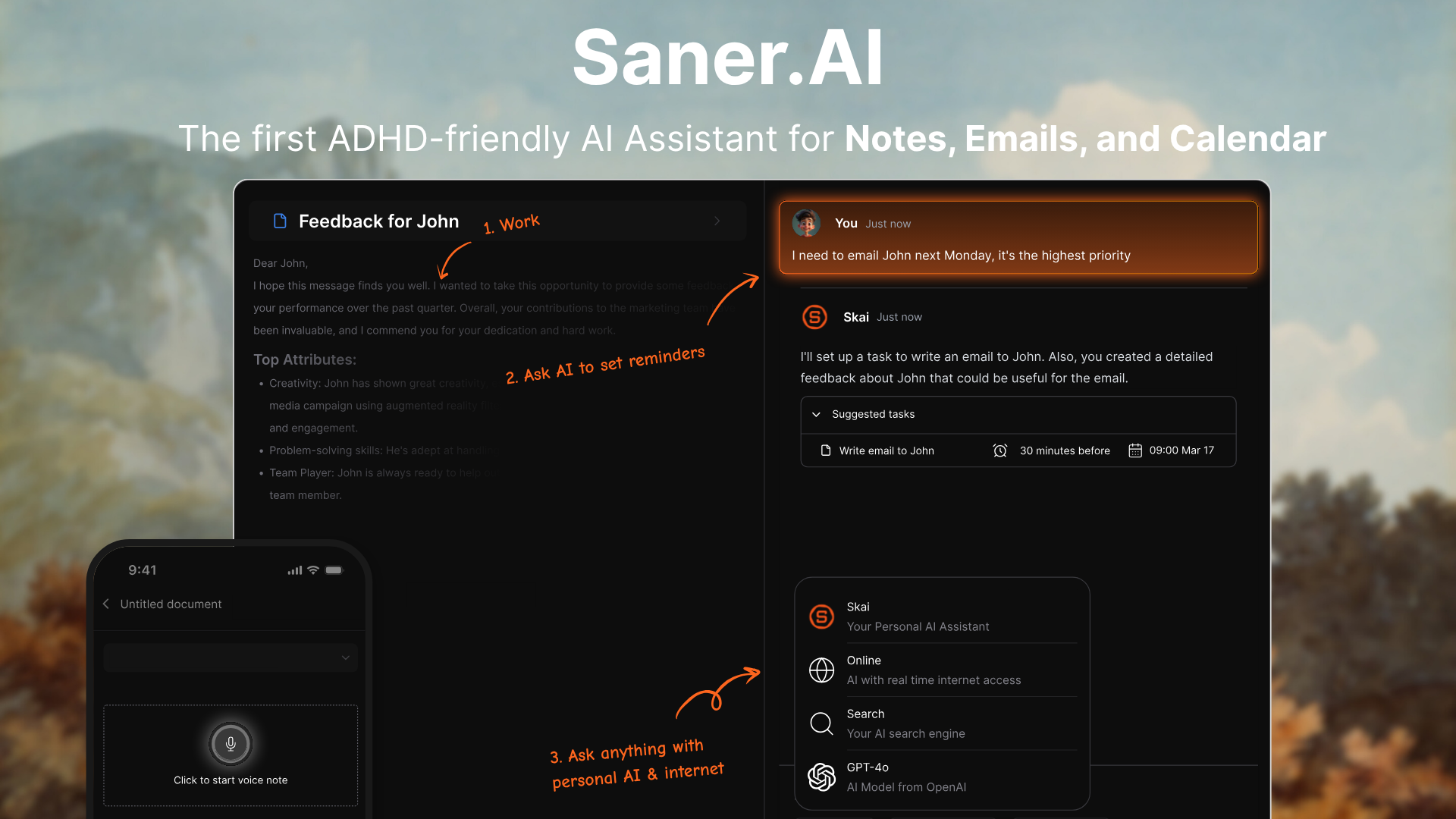
Saner.AI is an AI workspace that helps you capture, search, and synthesize information across your notes, web content, and external AI models. Unlike traditional AI search tools like Perplexity, it doesn’t just find answers - it builds connections between what you already know and what you discover online.
Key features
- Smart Assistant (“Skai”): Suggests next actions, creates reminders, and breaks down tasks from unstructured notes
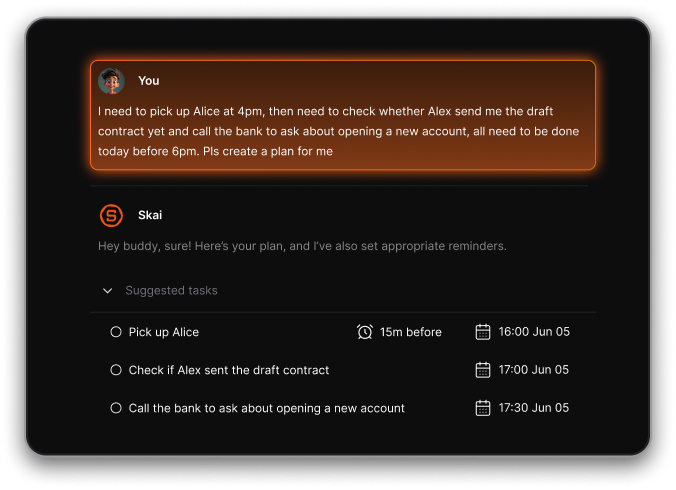
- External AI Model Integration: Connect to other AI models and use them inside Saner for flexible reasoning and diverse perspectives.
- Web & Model Browsing: Search online sources or external AI responses directly within your workspace.
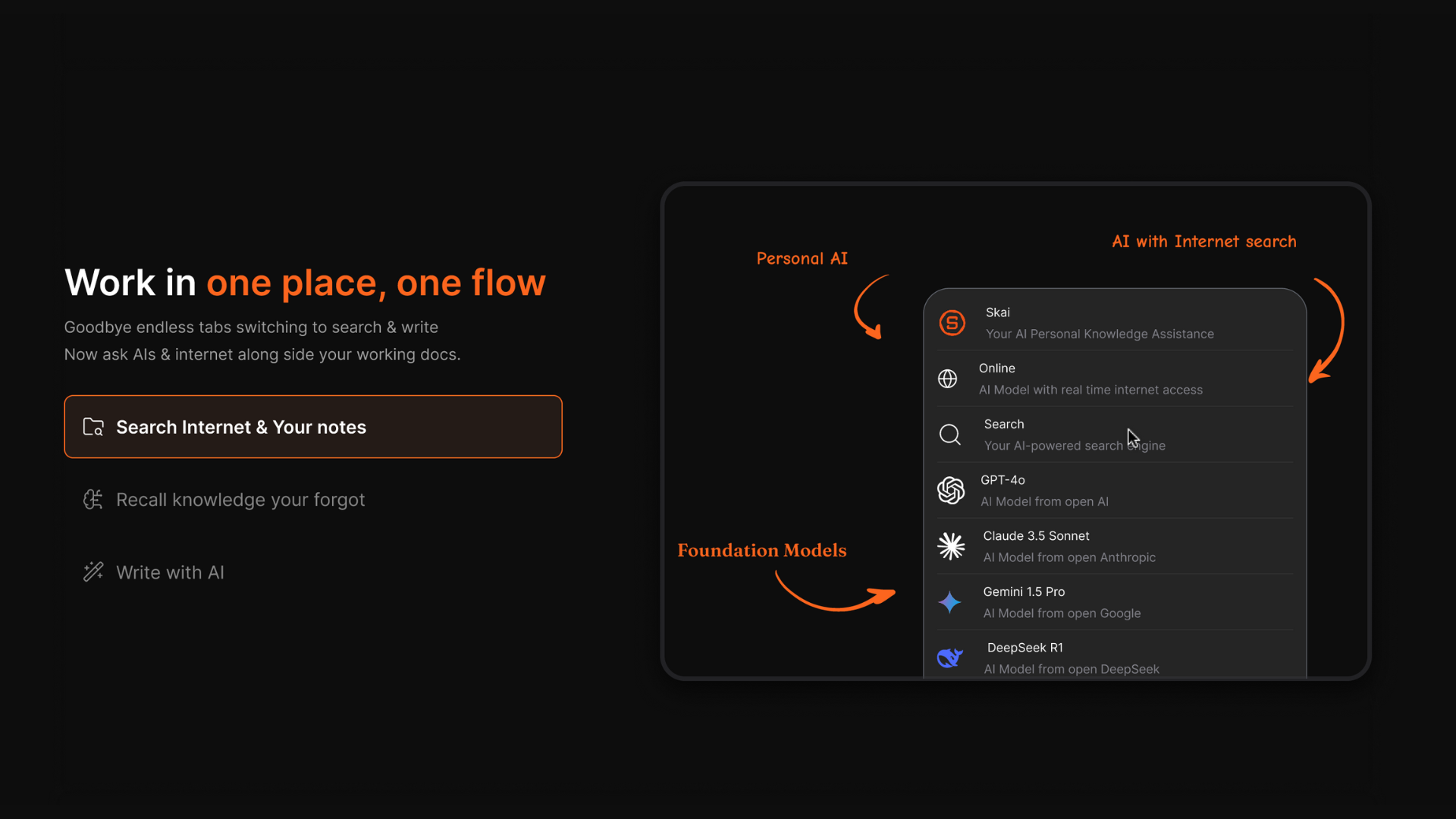
- AI planning: helps you prioritize your tasks and plan your day based on what’s due or important
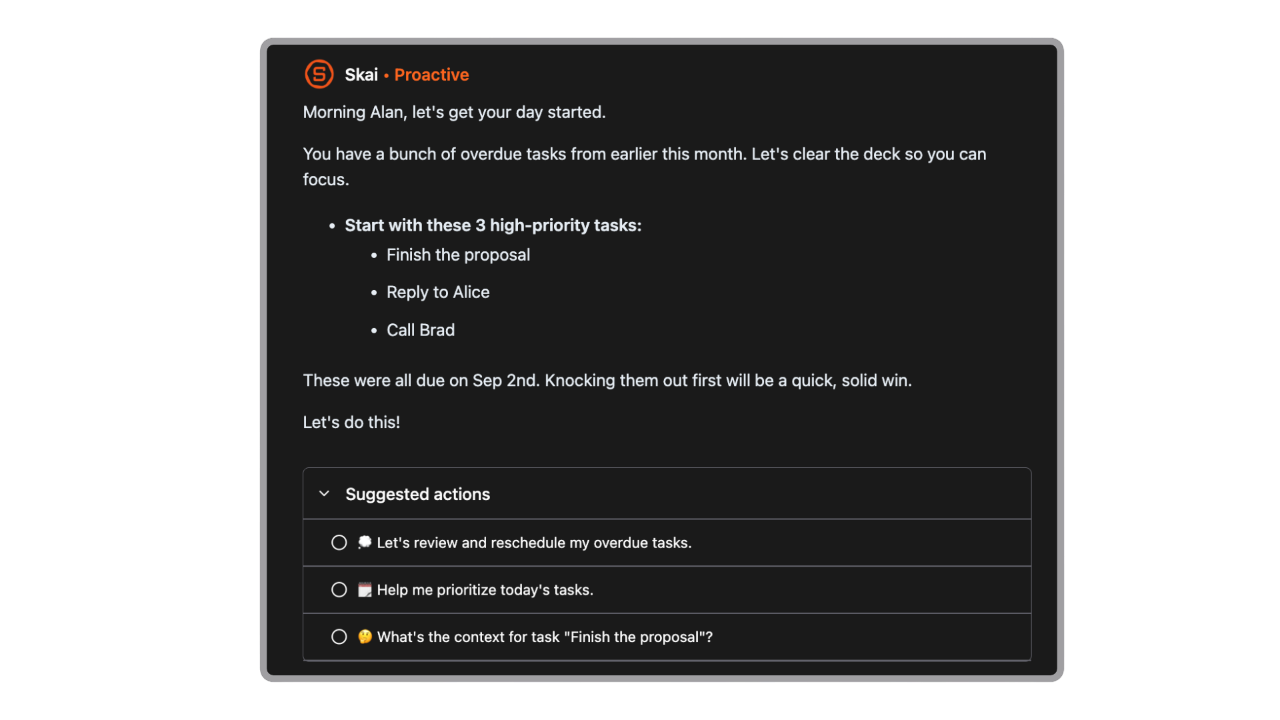
- Automatic Context Linking: Detects related notes and surfaces insights you may have missed.
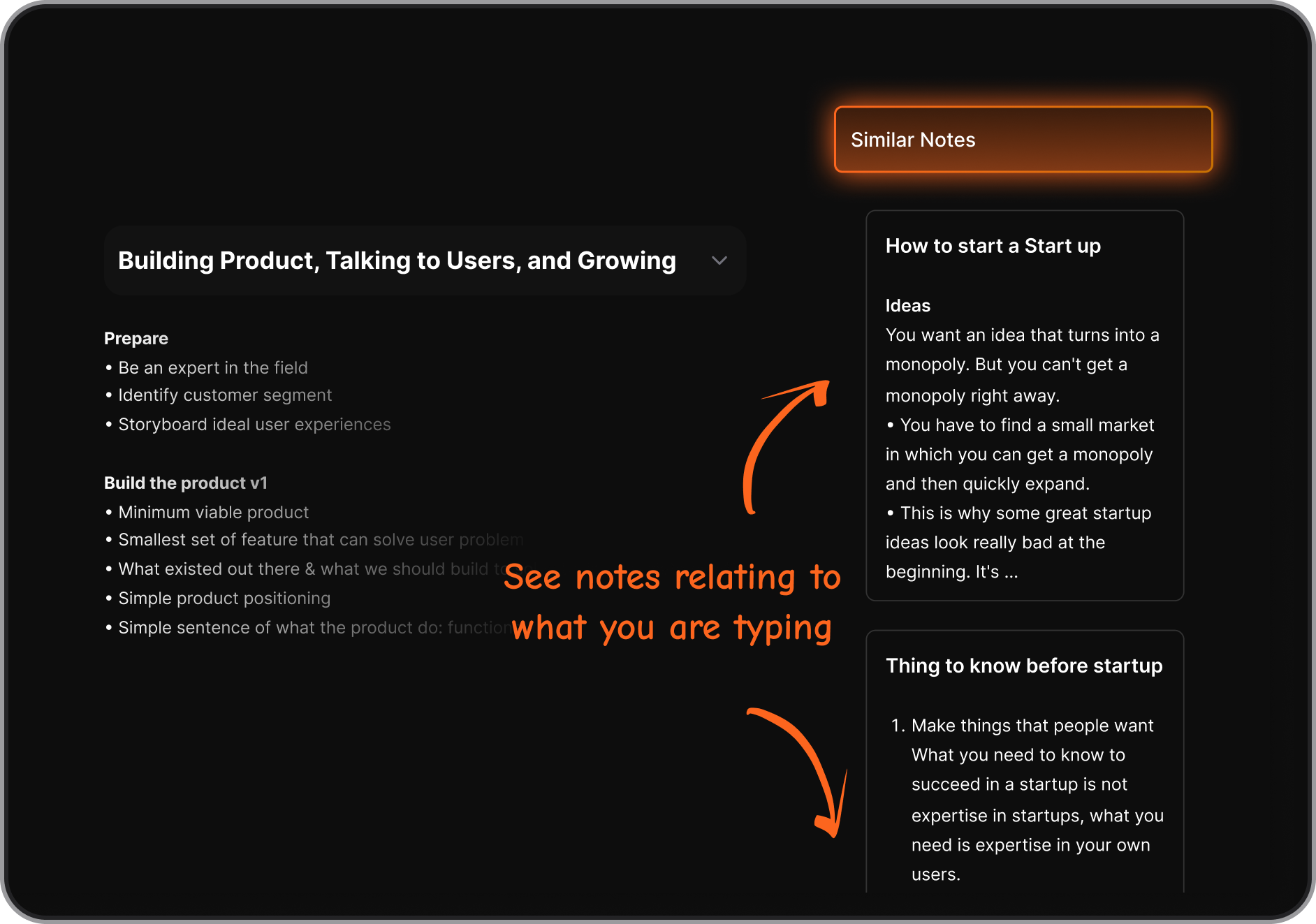
What I liked
- The combination of search, notes, and external AI models is powerful. You can ask questions like “What do I already know about AI research?” and get results that combine your notes with new insights from connected models.
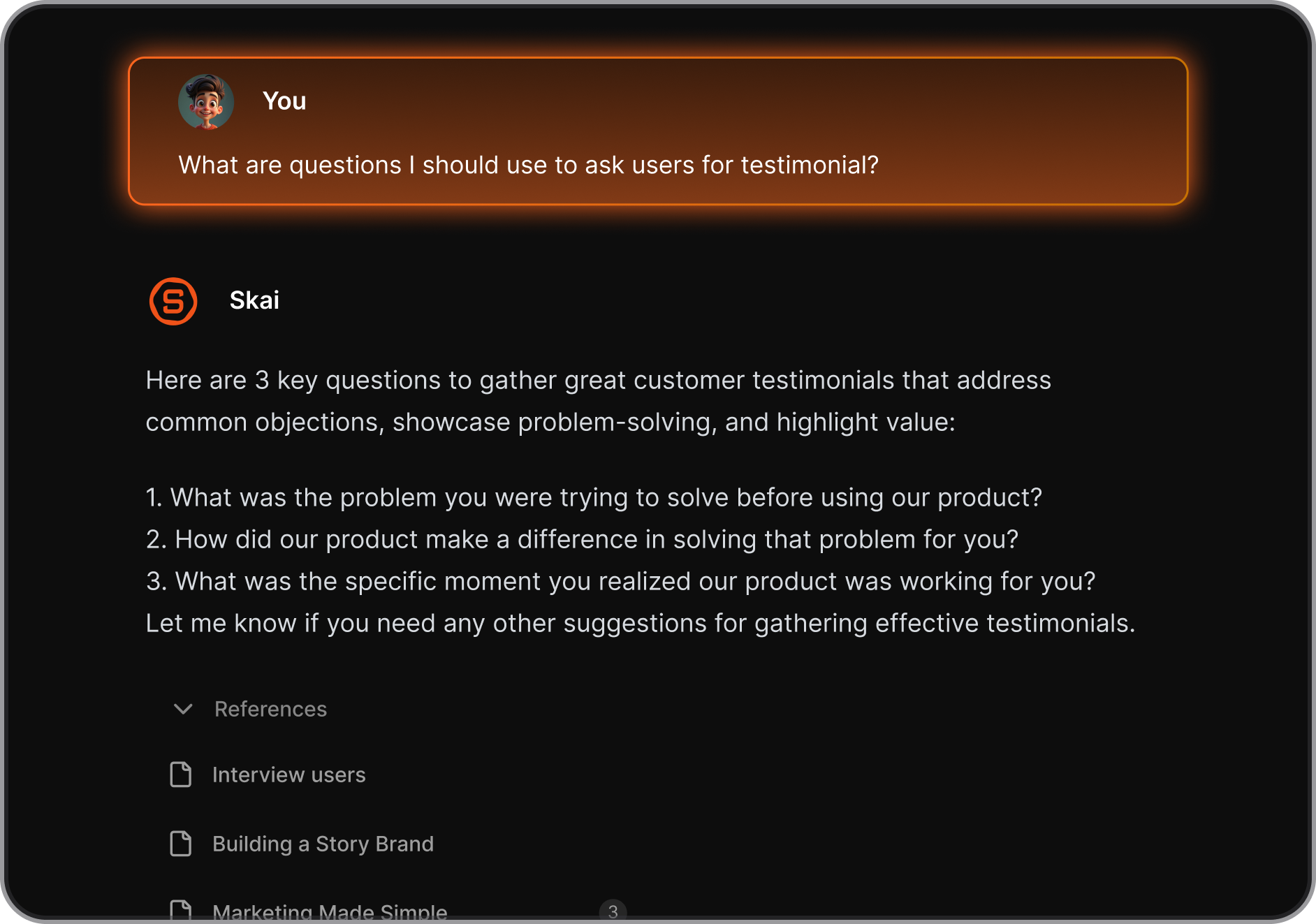
- The integration with external AI tools means you’re not limited to one model - you can test or compare outputs from different AIs inside the same workspace.

Cons
- Requires internet access for full functionality
Saner.AI Reviews

Pricing
- Free
- Starter: Monthly at $8/month, Annually at $6/month (with early user discount)
- Standard: Monthly at $16/month, Annually at $12/month (with early user discount)
Suitable for
- Researchers, entrepreneurs, and professionals who want an AI workspace that combines web search, notes, and external AI reasoning in one place.
How to start
- Sign up at saner.ai, import your notes or drive files, and connect your preferred external AI models to start exploring.
Work more efficient with your Perplexity Alternatives
2. Google Gemini

Gemini is Google’s AI chat assistant that’s now deeply integrated with online search. Rather than just being a chatbot, Gemini powers new “AI Mode” and “Deep Search” features inside Google Search.
Key features
- AI Mode in Search: Lets you ask multi-part, conversational questions and get AI-generated summaries instead of just web links
- Deep Search: Uses advanced reasoning to handle complex research queries like comparisons, analysis, or trend breakdowns
- Multimodal input: Accepts image, voice, and text so you can ask questions naturally, like “what’s this dish?” or “summarize this PDF”
- Browser and device integration: Works across Chrome, Android, and Search apps, keeping context across platforms
What I liked:
- The shift from keyword search to conversational answers feels natural and saves time when doing research
- Multimodal input is convenient
What I disliked:
- It’s heavily tied to Google’s ecosystem - you’ll need a Google account and may miss out if you prefer other browsers or search engines
- Advanced modes and larger models are locked behind paid tiers.
Pricing:
- Free tier - includes core chat and multimodal features
- Advanced / Pro plan - around $19.99 per month
Suitable for:
- Professionals, researchers, and students who want an AI-enhanced online search with conversational reasoning built into Google’s ecosystem
How to start:
- Go to gemini.google, sign in with your Google account, and start for free
Google Gemini review (source)

3. ChatGPT

ChatGPT is a conversational AI assistant that has evolved into a hybrid search + chat assistant. Instead of opening multiple tabs or scrolling through search results, it can pull real-time information from the web and summarize it in natural language
Key features
- Web Search Integration: Fetches up-to-date information from the internet and presents summarized answers.
- Source Transparency: Provides citations and references for the content it retrieves.
- Conversational Interface: Lets you ask questions naturally, like talking to a research assistant.
What I liked:
- The new web search feels seamless - you can ask for current topics, and it finds and summarizes reliable sources within seconds.
- Security and enterprise options give confidence for business use.
What I disliked:
- Sometimes the summaries lose nuance, especially for technical or academic queries.
- While it’s great for general research, it still isn’t a dedicated search engine - heavy researchers might prefer tools like Consensus for deeper citations.
Pricing:
- Free plan available with basic model and limited web access.
- ChatGPT Plus plan at $20/month
Suitable for:
- Professionals, students, and creators who want an all-in-one chat and search experience to explore real-time topics, summarize research, or verify information.
How to start
- Go to chat.openai.com or download the ChatGPT app, sign up for a free account, and start chatting
ChatGPT Reviews (source)

4. Claude

Claude is an advanced conversational AI assistant built by Anthropic that goes beyond static LLM replies by searching the web in real time, delivering up-to-date responses with source citations. For anyone who uses Perplexity to dig into current data, trends, or research, Claude is a strong alternative with a greater focus on reasoning, accuracy, and privacy.
Key features
- Real-time Web Search: Fetches current information from the internet and includes direct citations in responses
- Smart Triggering: Automatically decides when a live search is needed for new or time-sensitive topics
- Source Transparency: Displays source links so you can verify facts and dive deeper
- Large Context Window: Handles long documents and conversations with advanced reasoning
What I liked
- Claude’s web search feels genuinely helpful when you need current facts or news. It’s smart enough to pull real data, summarize it, and present clear sources without overwhelming you with raw links.
- The writing style is natural and concise, great for professionals who want quick, trustworthy summaries.
What I disliked
- The model doesn’t always trigger a live search, even when you might expect one, so you sometimes need to ask explicitly.
- It’s less of a browsing tool than Perplexity
Pricing
- Free plan with limited messages.
- Pro plan at $20/month with faster access and higher limits.
- Team plan: $25–30 per user/month
Suitable for
- Professionals, researchers, and teams who need up-to-date information with clear sources and want an AI assistant that values accuracy and reasoning over speed
How to start
- Go to claude.ai, create a free account, enable web search in the settings, and start prompting it with requests that need current information
Claude reviews (source)

5. Grok

Grok is an AI assistant that combines real-time web results and social data to give conversational answers. It’s designed for people who want fast, current, and contextual information - making it a strong Perplexity alternative for live online search.
Key features
- Live Web & X Search: Pulls data directly from the web and X (formerly Twitter) to deliver up-to-date responses.
- DeepSearch Mode: Goes beyond surface-level results by reasoning across multiple sources.
- Multimodal Input: Supports text and image-based interactions.
- Standalone Web & Mobile App: Available on both web and mobile, not limited to the X platform.
What I liked
- Grok’s ability to pull fresh data makes it great for news, trend tracking, or anything time-sensitive.
- DeepSearch actually tries to synthesize perspectives, not just summarize links.
What I disliked
- The playful tone can feel too casual if you’re using it in a professional or academic setting.
- Source transparency isn’t always as detailed as research-focused tools.
Pricing
- Free tier with usage caps and limited access
- SuperGrok plan costs around $30/month with higher limits and added features
Suitable for
- Professionals, researchers, and everyday users who need real-time search results and prefer a conversational AI experience.
How to start
- Visit grok.com or download the Grok app, create a free account
Grok review (source)

6. Consensus

Consensus is an AI-powered search engine designed for evidence-based research. Instead of scraping the open web, it pulls directly from peer-reviewed scientific papers and summarizes insights in plain language.
Key features
- AI Research Summaries: Uses natural language queries to summarize answers from real academic papers
- Massive Database: Searches across 200M+ peer-reviewed studies covering multiple disciplines
- Consensus Meter: Shows how strongly research agrees or disagrees on a given topic (Yes/No/Mixed)
- Paper Insights: Displays the title, summary, and citation for every referenced study
What I liked:
- It saves hours of manual searching. You just ask a question like “Does caffeine improve focus?” and instantly get summarized findings with cited studies.
- The Consensus Meter helps visualize whether a topic has strong agreement in research, which is incredibly useful for writing or decision-making.
What I disliked:
- It’s not conversational - you can’t chat with it like an AI assistant.
- Some very recent papers may not be indexed right away.
Pricing:
- Free plan with limited deep searches and unlimited basic searches
- Premium plan at $11.99/month or $8.99/month billed annually
- Power user plan is around $45/month for heavy researchers
Suitable for:
- Researchers, students, content creators, and professionals who want scientifically verified insights instead of general AI-generated answers.
How to start:
- Visit consensus.app, create a free account, and start searching immediately.
Conclusion
Perplexity AI reshaped how we search - turning static queries into dynamic, conversational answers with credible sources. But the AI search landscape in 2025 is far richer than a single tool.
Each alternative on this list brings its own superpower:
- Saner.AI turns insights into action with notes, tasks, and integrated AI models.
- ChatGPT gives you limitless creativity and deep reasoning.
- Claude excels at structured, thoughtful research.
- Gemini bridges AI with Google’s powerful ecosystem.
- Grok delivers lightning-fast real-time insights.
- Consensus grounds your findings in peer-reviewed science.
No single AI search tool wins across all dimensions - accuracy, personalization, creativity, and workflow integration each matter differently depending on how you work.
If you rely on AI for research, writing, or decision-making, the best move isn’t to find a perfect replacement- it’s to build your own toolkit. Combine fast engines like Perplexity or Grok with deeper reasoning tools like Claude or ChatGPT, and layer a workspace tool like Saner.AI on top.
AI search is no longer just about finding answers - it’s about building an ecosystem that helps you think, create, and act smarter.
Try a few of these alternatives side by side, and you’ll quickly see which one feels like your real-world research partner.
Stay on top of your work with the top Perplexity Alternatives
FAQ: Best Perplexity Alternatives (2025 Guide)
1. What are the best Perplexity alternatives in 2025?
If you love Perplexity’s AI search but want something that fits different workflows, here are the top alternatives to try:
- Saner.AI - Turns your notes, emails, and internet research into connected insights and tasks.
- ChatGPT – Great for open-ended exploration and brainstorming.
- Claude – Known for its long-context reasoning and human-like writing tone.
- Gemini – Integrated with Google Workspace for seamless document and web insights.
- Grok – Real-time search with a witty personality, built for quick summaries.
- Consensus – Academic-focused AI that pulls data from peer-reviewed research.
Each tool approaches “AI search” differently - from research validation (Consensus) to contextual productivity (Saner.AI).
2. What is Perplexity AI used for?
Perplexity AI combines real-time web results with natural-language answers, helping you research, summarize, and cite information faster. It’s especially popular among students, journalists, and analysts who want trusted sources behind every answer.
3. Why look for Perplexity alternatives?
While Perplexity is excellent for quick web-based answers, some users want:
- Deeper personalization (Saner.AI remembers your context and notes)
- Private or offline access (ChatGPT and Claude allow this)
- Better workspace integration (Gemini syncs with Gmail, Docs, and Sheets)
- Academic credibility (Consensus verifies sources)
- Creative exploration (Grok and ChatGPT generate new ideas fast)
Different needs call for different AI companions.
4. Which Perplexity alternative is best for productivity and note-taking?
Saner.AI stands out here.
It doesn’t just search the web - it searches your brain dumps. You can ask:
“Find the note where I mentioned the investor feedback last week”
“Summarize all ideas tagged ‘marketing launch’”
It connects your notes, tasks, and calendar automatically, turning fragmented ideas into structured action. Ideal for busy professionals, entrepreneurs, and ADHD-prone thinkers.
5. Which alternative offers the most accurate, cited research?
Consensus is built for this.
It searches academic papers and summarizes verified studies - perfect for students, researchers, and journalists who want evidence-based answers, not speculation.
6. Which Perplexity alternative is best for everyday chatting and creative work?
ChatGPT and Claude dominate here.
- ChatGPT offers flexible conversation, code generation, and writing support.
- Claude feels more natural and context-aware, handling long documents with ease.
Both are great if your goal is creativity or deep thinking, not just search.
7. What’s the best free Perplexity alternative?
Most of these tools offer free access:
- ChatGPT – Free tier with conversational search.
- Gemini (Google AI) – Free via Gmail or Google Workspace.
- Saner.AI – Free plan with AI search, calendar sync, and task chat.
- Consensus – Free access for basic academic searches.
Start free, then upgrade if you need advanced context memory or API access.
8. Which Perplexity alternative is best for researchers and students?
Consensus for academic credibility.
Saner.AI for managing mixed notes, citations, and meeting takeaways.
ChatGPT or Claude for drafting essays and simplifying complex topics.
Together, they cover both accuracy and workflow.
9. Which tool is best if I want to connect my own notes or files?
That’s Saner.AI’s sweet spot.
It understands your uploaded notes, emails, and PDFs - then lets you chat with them naturally.
It’s like having a private Perplexity that knows your personal context.
10. Which AI search tool gives real-time information?
Perplexity, Gemini, and Grok offer real-time web access.
ChatGPT and Claude rely on their internal models (though ChatGPT Plus users get web browsing).
Saner.AI focuses more on your own data than the open web - but it also allows you to search real-time information in the app
11. Which Perplexity alternative is best for entrepreneurs or founders?
Saner.AI helps founders think clearly without getting overwhelmed:
- Turns chaotic notes into action items
- Prepares daily summaries and reminders
- Brings up investor or client context automatically
- Works across notes, emails, and meetings
It’s a great choice if your “research” often lives inside your own head or inbox.
12. Can any of these AI tools work as meeting or decision assistants?
Yes.
- Saner.AI can recall decisions, surface follow-ups, and schedule tasks.
- Claude can summarize long transcripts.
- Consensus can validate claims with research.
Together, they help you go from meeting overload to clear action.
13. Which Perplexity alternative works best on mobile?
- ChatGPT and Gemini have polished native apps.
- Saner.AI works well in mobile browsers and supports quick voice input.

- Grok integrates directly into X (Twitter).
Pick based on where you do most of your thinking - desktop, mobile, or social.
15. What’s the future of AI search beyond Perplexity?
AI search is moving from “finding information” to understanding you.
Tools like Saner.AI blur the line between research and execution - your AI won’t just tell you what to do, it’ll help you do it. Expect future tools to:
- Combine private and public data sources
- Learn your preferences over time
- Generate insights automatically, not only on request
The best Perplexity alternatives are already heading there.
16. Which Perplexity alternative is most ADHD-friendly?
Saner.AI again.
It’s built by ADHDers, for ADHDers - reducing context switching and turning thoughts into organized tasks. You don’t have to remember where something was written; you just ask, and it finds it.
17. Final takeaway: What’s the best Perplexity alternative overall?
It depends on your use case:
| Goal | Best Tool |
|---|---|
| Research with sources | Consensus |
| Personal knowledge & task assistant | Saner.AI |
| Deep conversation or writing | ChatGPT / Claude |
| Real-time search | Gemini / Grok |
| Academic or verified info | Consensus |
No single tool replaces Perplexity entirely - but the right mix of Saner.AI + Consensus + ChatGPT covers nearly everything from trusted research to personal productivity.
Stay on top of your work and life
